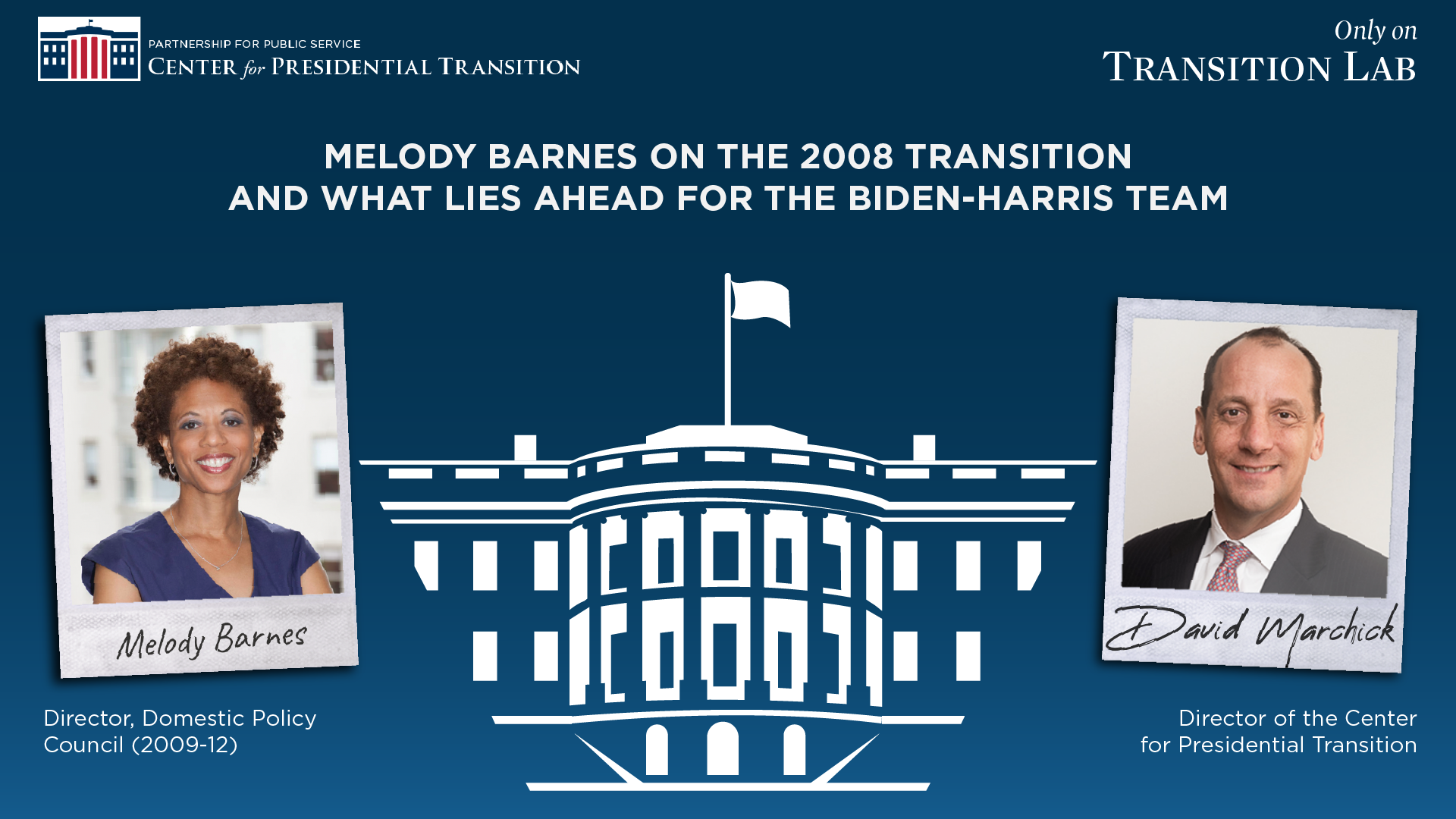Blog
November 16, 2020
Melody Barnes on the 2008 Transition and What Lies Ahead for the Biden-Harris Team
Melody Barnes has a distinguished political career. She has worked in various roles on Capitol Hill, held senior positions with the 2008 Barack Obama presidential campaign and transition teams, and led the White House Domestic Policy Council from 2009-2012. Currently, she is the co-director for policy and public affairs at the University of Virginia’s Democracy Initiative. In this episode of Transition Lab, Barnes joined host David Marchick to discuss post-election transition planning, how new administrations plan and implement policy and why we need a smooth transfer of power today.
[tunein id=”t158772969″]Read the highlights:
Barnes described how a transition team sets priorities after its candidate wins the presidential election.
Barnes: “Immediately, the transition begins to think about what the president is going to do on the day that he or she is inaugurated. For better for worse, America has become fixated on the first 100 days. …So [new administrations look at] executive orders, what’s been done by a prior administration [and] what might be overturned because of the law. [They also examine] what’s going to happen on Capitol Hill [and] the first pieces of legislation that a new administration wants to push. …It really is three-dimensional chess when a new administration walks in the door.”
Barnes discussed how the Obama administration decided which issues to focus on early in its first term.
Barnes: “People often questioned why this versus that. Why not do a big push on immigration coming out of the blocks? Why so big and comprehensive a health care bill right out of the blocks? Those were decisions that we made based both on substance and timing. We believed we had political capital that we could spend [and] that the nation had been focused on the issue of health care, [which] was also wrapped up in the issue of the economy. So we were thinking about all of those things—the politics, the substance and the signals that [we] were sending as [we made those] decisions.”
Barnes explained how transition teams process information after the election.
Barnes: “For the transition, it feels as though several trucks back up to the front door and unload reports, documents and lists of names. They just come spilling out. …And [transition teams are] trying to figure out how to … sift through what’s coming in that may or may not be useful. [In 2008], we created a process for tagging and accepting all of the reports and ideas that were coming through the door so that we would have access to them. And there was a very organized meeting process that was put in place so that we could talk to people. …What you don’t want to do is look at everyone that has supported the campaign … and all the expertise that sits on the other side of those doors and outside of government, and say, ‘Thank you so much. See you later, never.’”
Barnes offered advice on how to approach landing a job in a new administration.
Barnes: “[Share your information with] those who are doing personnel or those on the outside— whether it’s a caucus of members of Congress, or others that have a relationship with the campaign and the transition. …That’s another opportunity to put your information in a place where it will be received and processed. I also tell people that if you don’t get a call in the first few months, it doesn’t mean that you’ll never get a call. …Presidential personnel are getting thousands upon thousands upon thousands of resumes. So it will take a while, even if you are quite qualified, before they may turn to your information.”
Barnes discussed how new administrations work to implement big policy ideas.
Barnes: “One of the things that I learned working for Senator [Ted] Kennedy was that the best policy processes often begin with people putting lots of ideas on the table. Some of them are wacky, but possess the germ of something interesting and important. …It is the process of [refining] those ideas and engaging with the policy people, the legislative affairs people, the political people, the communications team and others to create something that has a snowball’s chance of getting over the finish line.”
Barnes explained why we need a smooth transition now more than ever.
Barnes: “Even as we go through this period where the current president will not agree that President-elect Biden is, in fact, President-elect Biden, the health of the nation [and] our national economy hang in the balance. [The Biden-Harris agency review] teams should be able to meet with folks at the Defense Department and the Department of Health and Human Services to do planning and work around [developing and distributing a coronavirus vaccine].”
Barnes discussed the challenges President-elect Biden might face working in a divided government.
Barnes: “It’s certainly easier when you don’t have divided government. People have often spoken about the fact that the president-elect has a long standing relationship with [Senate Majority Leader] Mitch McConnell and long-standing Hill relationships from his days in the White House and the Senate. I think those relationships will and could make a difference when there is agreement to move forward. …[But] the road will be challenging.”
Marchick jokingly asked Barnes whether she was upset about Kamala Harris’ ascension to the vice presidency, meaning that Barnes would no longer be considered one of the most senior women of color ever to serve in the White House.
Barnes: “I think about colleagues like [former White House Deputy Chief of Staff for Policy] Mona Sutphen and others. What an amazing group of women to have as peers. And I would venture to say that, to a person, we would all say that this is one of the proudest moments for each of us as women and women of color. …There is a history of political engagement and activism—from anti-lynching campaigns and suffrage to civil rights and so many other issues— that is a leitmotif that plays behind the careers [of government leaders who are women of color]. To see Kamala Harris standing there and accepting the congratulations of the crowd when the election had been called was just one of the proudest moments that I have ever had.”



